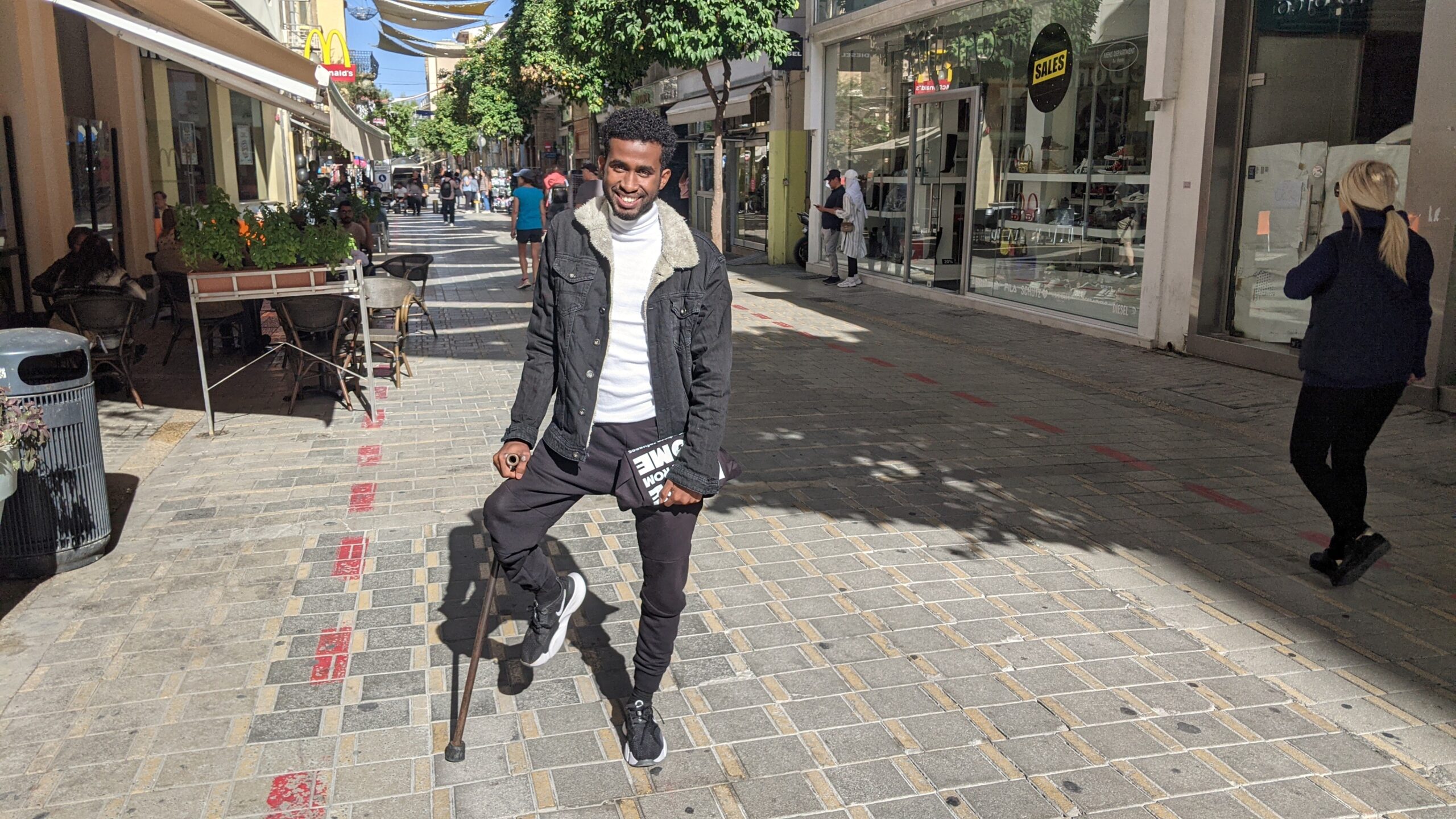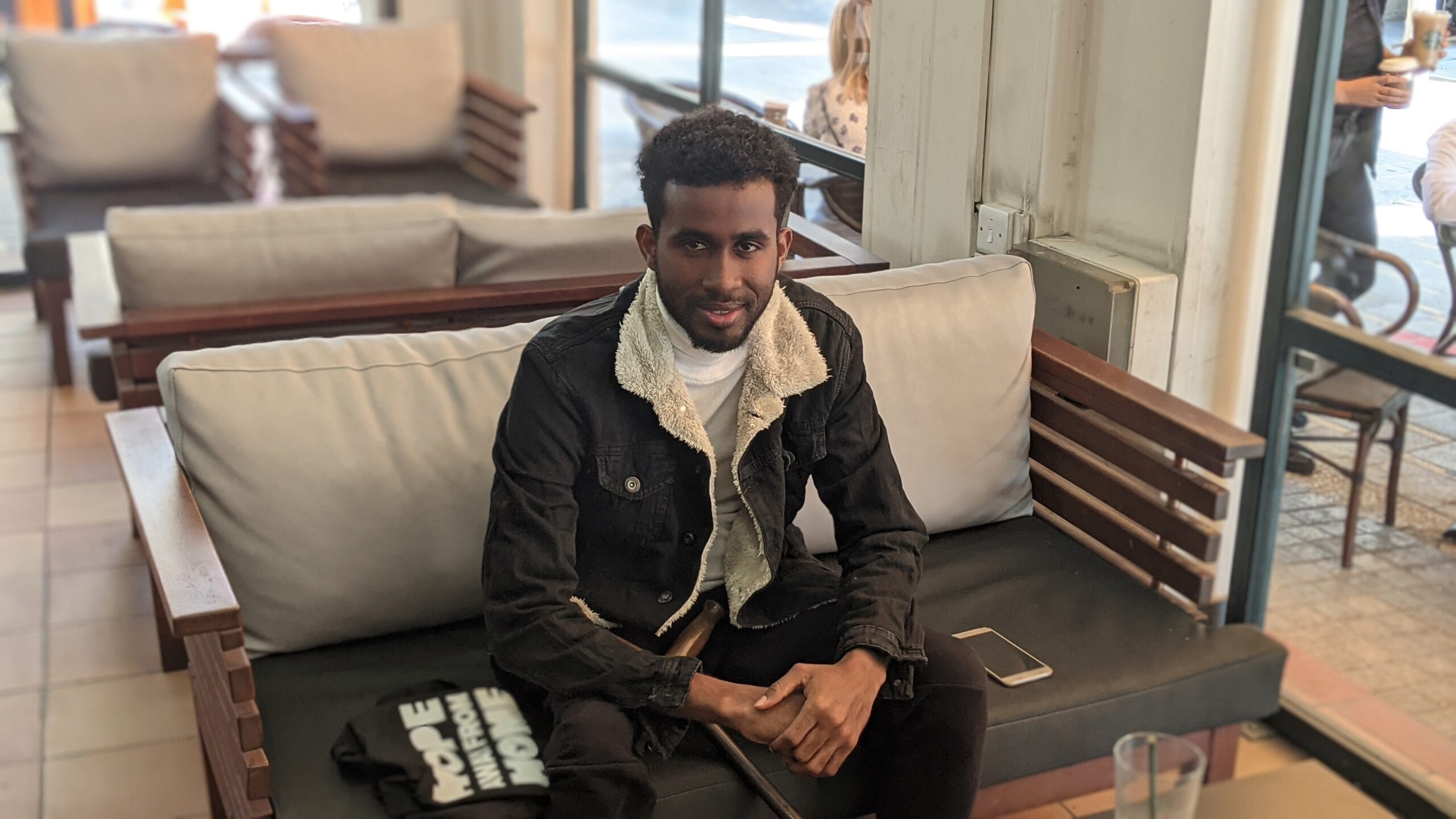
Being recognised as a refugee in Cyprus has given Mohammed the possibility to live more independently, pursue his education and help others. © UNHCR Cyprus
On the occasion of the International Day of Persons with Disabilities, we met Mohammed Ali, a recognised refugee from Somalia. Bright-eyed and mild-mannered, he is a positive and kind person who is eager to achieve his goals, and to help others.
Growing up in Galkayo City, Somalia, Mohammed loved to play football as a young boy. But at age 8 he fell sick with polio and had to stop playing, though his passion for the sport and watching football is still strong today. “Growing up with a disability in Somalia, you are seen as different,” said Mohammed. “I couldn’t go to school any more with the other children.”
Mohammed is the eldest of 10 siblings and two adopted cousins. “You feel good growing up in a big family,” he said. “Your brothers and sisters are always there to help you. It’s the most important thing you can have.” After he got sick, it was his mother who guided him and said: “Everyone has something in life. You must not get stuck thinking about being disabled and limit yourself. You can do whatever you want in your life.” Mohammed is also grateful to a volunteer who taught children English, Somali and maths in his neighbourhood. “It’s because of him I speak English and I can read and write and do mathematics. Because of him I was able to later go to high school and graduate.”
Now 27 years old, Mohammed arrived in Cyprus and sought asylum two years ago. He spent his first night sleeping on the beach with just 10 Euros in his pocket. “I bought a small bottle of water and gave the rest of my change to a young child who was asking for money,” he said. Arriving at Pournara, Mohammed remembers it was cold and overcrowded, but owing to his vulnerability, he was assigned a prefabricated unit with access to electricity. “I was lucky I had a warm room to sleep in and a decent bathroom next to our room,” he said.

Mohammed is a recognised refugee from Somalia who lives in Nicosia Cyprus. © UNHCR Cyprus
Mohammed spent two months at Pournara. After that the social welfare services found housing for him in a shared house in Nicosia. “We were six people in each room, and three rooms in the house. We didn’t have a washing machine, so we had to wash our clothes by hand,” Mohammed recalls. In order to be able to go grocery shopping, he would ask one of his housemates to go with him to help him carry things home. “I know how to cook,” he said, smiling. “I learned from my mother when I was young.” With a small amount of emergency cash, he had to wait for five months without a welfare cheque. “Caritas helped me in that time,” he said. Mohammed spent a year and four months at the shared house. During this time, even though his options and access to work and education as an asylum-seeker were limited, he took Greek lessons and earned a certificate from Caritas. He also registered for state education classes but had to stop because he couldn’t afford the bus tickets to get to the lessons.
Since being recognised as a refugee this summer, Mohammed has more opportunities and services available to him. “Now I am taking Greek lessons at the University of Cyprus with a scholarship…It’s a great programme; the teachers are very nice,” he said. He now has a disability bus card that enables him to live more independently, like doing his shopping alone and get to his classes. “I take the bus several times a week and I practise Greek with the bus driver,” he said.
“Getting refugee status morally changed my life,” said Mohammed, adding that he feels better having his bus card; being able to see a doctor more easily and having more opportunities for education and scholarships. He has signed up for basketball for persons with disabilities three times a week and will be attending more regularly when the schedule of his Greek language classes permits. “I spend most of my time learning,” said Mohammed. “Even at Pournara, I used to read about Cyprus history online.”
Being recognised as a refugee and with life gradually improving, Mohammed now has a chance to think about his future. “I want to work; I don’t want to receive money from the government. That’s why I learn Greek…I would like to work in tourism…I like to be around people and help others.” Since receiving refugee status, Mohammed said: “I go to the hospital and the Labour Office, and I translate for other asylum-seekers. I could see them having trouble with communication and language barriers, so I’m trying to help.”
Through his experience, Mohammed offers advice to other persons with disabilities: “Because you have a disability, that doesn’t mean you are completely disabled. You can do whatever you want in life. Don’t look only at yourself; look at everyone around you as well, because everyone has his own problem. And focus on getting education.”
————————————————–
The International Day of Persons with Disabilities promotes the rights of people with disabilities across society. Unfortunately, persons with disabilities are disproportionately affected by forced displacement, leading to increased risks of violence, discrimination, and exclusion. In Cyprus, UNHCR urges vulnerability assessments for asylum-seekers upon arrival and emphasizes the importance of addressing individual specific needs. Moreover, asylum-seekers with disabilities are excluded from social welfare programs, including disability schemes and the Minimum Guaranteed Income, leading to prolonged risks of poverty and homelessness. Their access to health care is also hindered while delays in asylum application assessments further hamper their access to essential support, limiting integration opportunities. UNHCR calls on national authorities to safeguard the rights of displaced people with disabilities, while combating discrimination, which they may have also encountered in their home countries.
Μοιράσου το στο Facebook Μοιράσου το στο Twitter